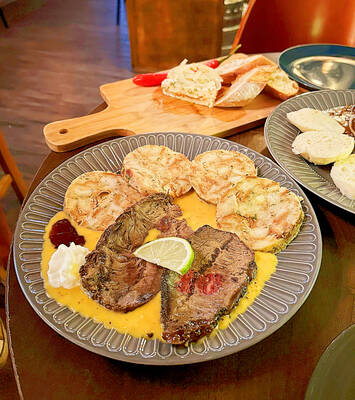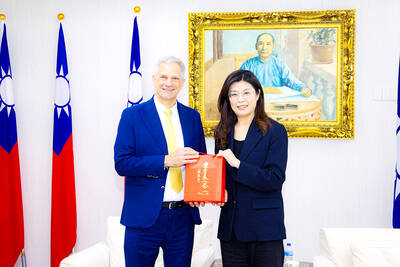Appearing delightfully spunky and full of merriment at a press conference held one week before the Golden Horse Awards (金馬獎), it was difficult to associate Chinese actress Monica Mok (莫小奇) with the corrupt character she plays in Liu Fendou’s (劉奮鬥) second feature, Ocean Flame (一半海水一半火燄).
Mok was sent by her parents to attend high school in Australia. After obtaining a master’s degree in finance, she returned to China in 2004 to pursue acting.
Mok tackled her first leading role in Ocean Flame. Her performance won a nomination in the Best Leading Actress category at this year’s Golden Horse awards.
Taipei Times: How do you feel about being nominated for the Golden Horse awards?
Monica Mok: It just feels magical!
TT: What attracted you to the project?
MM: Before the movie, Liao [Fan (廖凡), her co-star in Ocean Flame] and I were nodding acquaintances. One day he called me up and said, “Liu saw you on television. He wants you to audition for a role.” I went, knowing absolutely nothing about the project or the novel. After the audition, they said to me “don’t go. Stay.”
TT: You didn’t hesitate?
MM: Yeah, actors never turn down offers [laughing]. It never occurred to me that I might not be cut out for the job. At that time, I thought there was no way I couldn’t play the role. It wasn’t until I was actually on the set that I felt I really could not [laughing].
TT: Did you find the sex scenes a challenge?
MM: Actually, it was Liao who felt embarrassed because he is gentle and a bit shy in real life. I took the lead to take off his clothes [laughing]. If I acted abashed and uncomfortable, people would ask why I took the part. On the contrary, if I acted like there was nothing to feel awkward about, I would earn respect from the crew.
(Based on renowned Chinese writer Wang Shuo’s (王朔) novel of the same title, Ocean Flame tells the tale of a tortured love affair between small-time criminal Wang Yao and innocent waitress Li Chun. Geared to art-house moviegoers, the film received polarizing reviews for its overwrought, if not completely staged, emotions and excessively violent and twisted portrait of passion, desire and love. The film garnered five nominations at this year’s Golden Horse, including nominations for Best Actress, Best Feature Film, Best Cinematography and Best Art Direction categories.)
Rise
continued from p14
TT: What was working with director Liu like?
MM: Liu is a perfectionist. He always thought what we gave wasn’t enough. The feeling of frustration became a daily routine for me. For the violent scene on the beach, I remember there are only four words on the script to describe what we should do: run, chase, wrestle and scuffle. Liao and I put on what we thought was a violent act. But the director scolded. Before the camera started rolling for the second time, Liao slapped me across the face, twice, with all his strength. I was stunned. Adrenalin raced through my veins, and I felt like a boxer ready to fight. I got to beat the crap out of Liao too. It felt great [laughing].
TT: How did Liu approach the movie?
MM: Different directors handle their stories differently. Some choose to skirt around what is deemed violent and vicious. Liu chooses to show it all to the audience and he needs his actors to be capable of conveying such intense emotions. Liu has his own vision for the world he wishes to show and he couldn’t care less about what others think. I think all directors have, more or less, such a quality about them.
TT: How did the director help you to prepare for the role of Li Chun, who comes across as a twisted masochist?
MM: I was under a of lot stress during the shooting. The director deliberately created an isolated environment for me. The film crew wasn’t allowed to talk to me. Every day I returned to my room, feeling I wasn’t good enough.
TT: How did filming the movie affect you?
MM: I spent three months staying at home, sleeping, sobbing uncontrollably and visiting a Chinese medicine doctor.
TT: What is the most unforgettable scene you made in the film?
MM: Well, it was my first day on the set. I took it easy and mingled. The scene we were scheduled to do involved me spewing up after being drugged by a customer [the scene was later edited out]. There were three huge bowels of soup noodles and a bottle of wine on the table. But I didn’t give it much thought. After the lighting was set, the director turned to me and said, “Ok, now have a seat and eat.” It took three hours to finish the shooting. I cried, screamed and puked all over Liao. I have not even the faintest memory of what I said on that day [laughing].
TT: In the film, you play a woman who goes as far as ending her life to prove her love for her lover. Are you that intense?
MM: When I was younger, yea, it used to be like “love is all that matters.” I grew out of that, of course. Besides, I think all my intense feelings on the subject of love were used up in the film.
TT: Are there any similarities between yourself and Li Chun?
MM: Absolutely not, we are completely different. I want my boyfriend to be at my disposal [laughing]. I am more like Wang Yao in real life. I like to be in control. Liao is more like Li Chun. He is the Mr Nice.
TT: What is your understanding of the twisted character you played?
MM: I once asked the director how Li could fall in love with Wang. He is ugly, poor and violent [laughing]. Liu replied: “Don’t you find the whole thing exciting?” At one point, I even told Liu that I couldn’t identify with Li. “You don’t need to identify. You are an actress,” he said.
TT: In one scene, you and Liao are enchanting with your nude bodies glistening under a bright sunny sky. Did you prepare for taking your clothes off?
MM: Now I regret that I didn’t [laughing]. I am easily tanned. Put me under the sun for 20 minutes and I will turn brown. I remember on the first day on the islet, the director let us run loose on the beach [the film was shot on location on one of Hong Kong’s off-shore islets from May to August last year]. Two hours later, he yelled: “Umbrella!” [laughing]. There were two assistants holding sunshades behind Liao and I from that moment on. Liao worked out daily, which included aerobic exercise and running ... two months before the shooting started. Liao’s six-pack abs are the real deal. But I’m sure he is chubbier and paler by now [laughing].
TT: What’s your own reading of the film? Does the story speak to you?
MM: I must admit that I feel critical of the film now that I can leave my character behind. First of all, I don’t identify with the character. It is not love that brings the two together. It is some sort of game or the satisfaction of self-conquest both to the man and the woman. To Li, it is all about “I want to help you and save you.” Well, at least people remember the film. I’ve read polarizing reviews. Some condemn it as disgusting and perverted. But it is fiction, and to me, that’s exactly where the fascination lies. Don’t you just find it exciting? To use the director’s words.
TT: How badly do you want to take home a Golden Horse award?
MM: It will be a total lie if I say I don’t care about the result. I would probably cry if I lose.
(Mok didn’t win. Neither did Ocean Flame. The movie is now playing at local theaters.)

Seven hundred job applications. One interview. Marco Mascaro arrived in Taiwan last year with a PhD in engineering physics and years of experience at a European research center. He thought his Gold Card would guarantee him a foothold in Taiwan’s job market. “It’s marketed as if Taiwan really needs you,” the 33-year-old Italian says. “The reality is that companies here don’t really need us.” The Employment Gold Card was designed to fix Taiwan’s labor shortage by offering foreign professionals a combined resident visa and open work permit valid for three years. But for many, like Mascaro, the welcome mat ends at the door. A

If China attacks, will Taiwanese be willing to fight? Analysts of certain types obsess over questions like this, especially military analysts and those with an ax to grind as to whether Taiwan is worth defending, or should be cut loose to appease Beijing. Fellow columnist Michael Turton in “Notes from Central Taiwan: Willing to fight for the homeland” (Nov. 6, page 12) provides a superb analysis of this topic, how it is used and manipulated to political ends and what the underlying data shows. The problem is that most analysis is centered around polling data, which as Turton observes, “many of these

Divadlo feels like your warm neighborhood slice of home — even if you’ve only ever spent a few days in Prague, like myself. A projector is screening retro animations by Czech director Karel Zeman, the shelves are lined with books and vinyl, and the owner will sit with you to share stories over a glass of pear brandy. The food is also fantastic, not just a new cultural experience but filled with nostalgia, recipes from home and laden with soul-warming carbs, perfect as the weather turns chilly. A Prague native, Kaio Picha has been in Taipei for 13 years and

Since Cheng Li-wun (鄭麗文) was elected Chinese Nationalist Party (KMT) chair on Oct. 18, she has become a polarizing figure. Her supporters see her as a firebrand critic of the ruling Democratic Progressive Party (DPP), while others, including some in her own party, have charged that she is Chinese President Xi Jinping’s (習近平) preferred candidate and that her election was possibly supported by the Chinese Communist Party’s (CPP) unit for political warfare and international influence, the “united front.” Indeed, Xi quickly congratulated Cheng upon her election. The 55-year-old former lawmaker and ex-talk show host, who was sworn in on Nov.